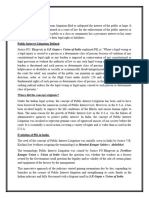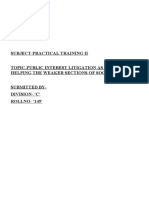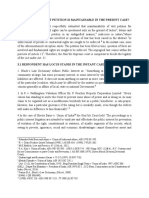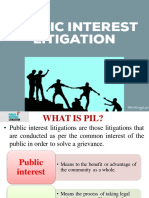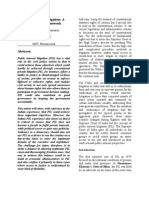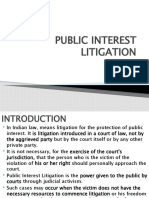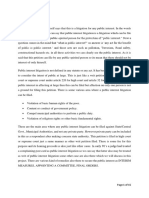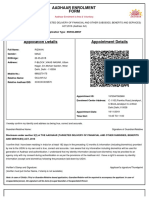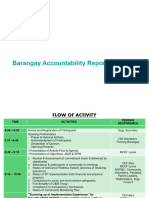PUBLIC INTEREST LITIGATION
LOCUS STANDI: Locus standi is a Latin term that means “standing to sue” or “the right to
bring an action in court.” In a legal context, it refers to the legal interest or right that a party
must have in order to bring a case before a court. To have locus standi, a party typically needs
to demonstrate that they have suffered a specific injury, harm, or have a direct interest in the
matter at hand.. The concept of locus standi is important because it helps to ensure that the
courts are not overwhelmed with frivolous or meritless claims. By requiring parties to have a
sufficient interest or stake in the outcome of a case, the courts can focus their resources on
resolving disputes that are truly important and relevant to the parties involved.
Evolution of PIL in India till 1960s and 70s the concept of litigation in India was seen as a
private pursuit for the enforcement of private interest. Litigation in those days consisted of
some action initiated by certain individuals usually addressing their own problems. The
initiation and continuous of litigation was a prerogative of the injured party or the aggrieved
party even this was greatly limited by the resources available with those individuals. In Indian
law public Interest Litigation means litigation for the protection of public interest. It is a
litigation introduce in a court of law not by the aggrieved but why the court itself or by other
private party. It is not necessary for the exercise of jurisdiction of the courts that the person
whose rights whether fundamental or legal have been violated should personally approach the
court. Thus with the introduction of PIL the traditional rule of Locus standi was relaxed in
certain cases.
In India the first reported case of Public interest litigation was Hussainara Khatoon vs State of
Bihar (1979). A writ petition of Habeas corpus was filed before the Supreme court under Article
32 of the Indian constitution for the release of 17 under trial prisoners. Those people were
considered to the poorest strata who weren't even able to afford an advocate and thus were not
able to secure bail from the court. The court realized the plight of under trial prisoners and
denial of their right of personal liberty as they were in the prison for a term longer than they
would have been if convicted for the offence they were charged thus the court held it to be the
violation of article 21 of the constitution and ordered the release of the prisoners.
1
Basement 8, Apsara Arcade, Karol Bagh Metro Station Gate No. – 6, New Delhi 110005
CONTACT NO. 8448440231
�In SP Gupta vs Union of India (1982) it was held that any member of public or a social action
group acting in a bonafide manner can file a petition for an appropriate direction, order or writ
in high courts under article 226 of the constitution in case of violation of any fundamental or
legal rights or in Supreme Court under article 32 of the constitution in case of violation of
fundamental rights seeking judicial redress for legal wrong or injury caused to a person or
determinate group of persons who due to disability arising out of their social or economic
conditions cannot approach the court. Thus any citizen or a social group can approach the
constitutional Courts of the country seeking legal remedies where the interest of general public
is at stake.
According to guidelines issued by the Supreme Court, Letter-petitions falling under the
following categories alone will ordinarily be entertained as Public Interest Litigation:
1. Bonded Labour matters.
2. Neglected Children.
3. Non-payment of minimum wages to workers and exploitation of casual workers and
complaints of violation of Labour Laws (except in individual cases).
4. Petitions from jails complaining of harassment, for (pre-mature release) and seeking release
after having completed 14 years in jail, death in jail, transfer, release on personal bond,
speedy trial as a fundamental right.
5. Petitions against police for refusing to register a case, harassment by police and death in
police custody.
6. Petitions against atrocities on women, in particular harassment of bride, bride burning, rape,
murder, kidnapping etc.
7. Petitions complaining of harassment or torture of villagers by co- villagers or by police
from persons belonging to Scheduled Caste and Scheduled Tribes and economically
backward classes.
8. Petitions pertaining to environmental pollution, disturbance of ecological balance, drugs,
food adulteration, maintenance of heritage and culture, antiques, forest and wild life and
other matters of public importance.
9. Petitions from riot victims.
10. Family Pension.
2
Basement 8, Apsara Arcade, Karol Bagh Metro Station Gate No. – 6, New Delhi 110005
CONTACT NO. 8448440231


